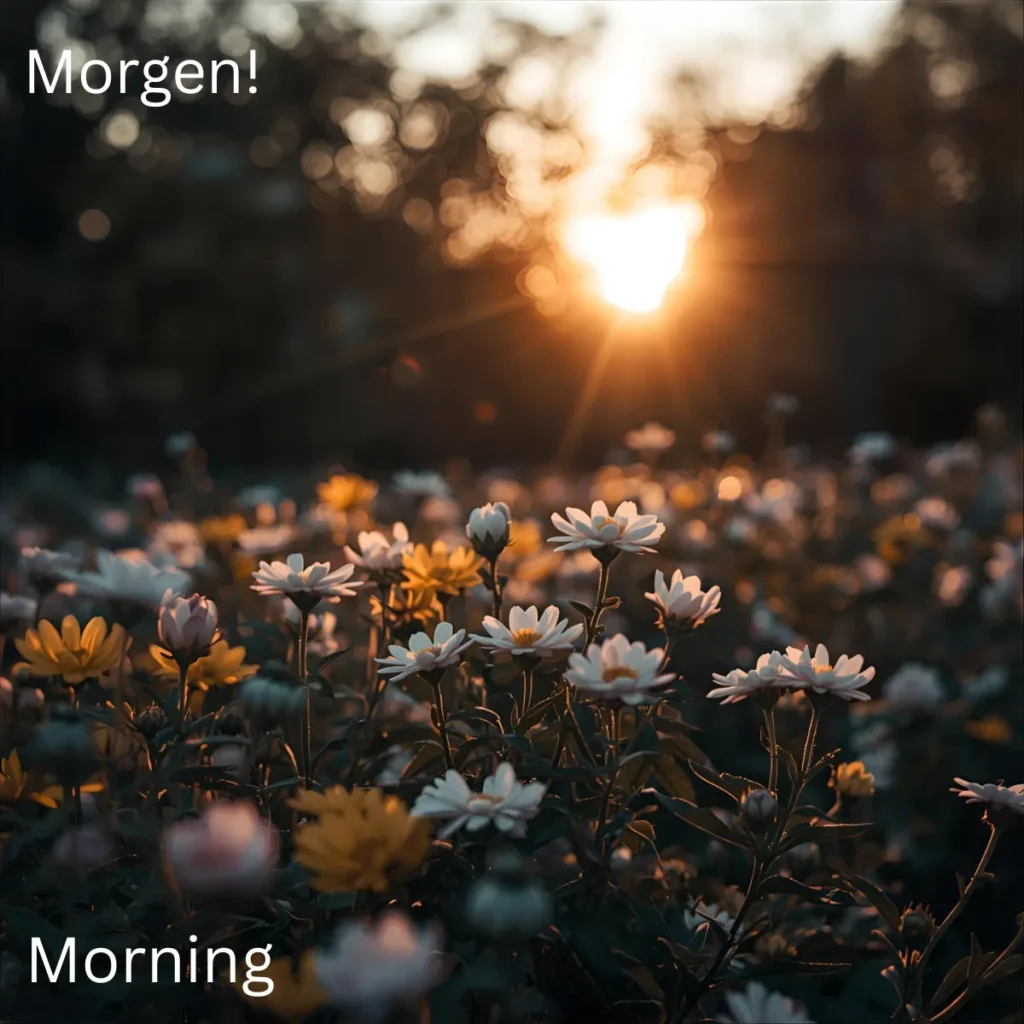Learning how to say good morning in German is one of the easiest and most useful greetings for everyday conversations. The most common phrase is Guten Morgen, but there are also variations you can use depending on the level of formality or the region.
Whether you’re traveling, meeting new people, or practicing your German, knowing the right way to greet someone in the morning will help you sound polite and confident.
Good Morning in German
Here’s a 15-phrases table for different ways to say Good Morning in German with English meaning, German phrase, and usage:
| # | English Phrase | German Phrase | Usage / Context |
|---|---|---|---|
| 1 | Good morning | Guten Morgen | Standard, formal & polite |
| 2 | Morning! | Morgen! | Casual, informal |
| 3 | A very good morning | Einen schönen guten Morgen | Friendly, polite |
| 4 | Morning everyone | Guten Morgen zusammen | Group greeting |
| 5 | Morning, my friend | Guten Morgen, mein Freund | Friendly |
| 6 | Good morning, sir | Guten Morgen, mein Herr | Formal, respectful |
| 7 | Good morning, madam | Guten Morgen, meine Dame | Formal, respectful |
| 8 | Good morning to all | Guten Morgen an alle | General, inclusive |
| 9 | Hey, good morning! | Hey, guten Morgen! | Casual & friendly |
| 10 | Good morning, how are you? | Guten Morgen, wie geht’s? | Conversational |
| 11 | Good morning, everyone | Guten Morgen, Leute | Informal group greeting |
| 12 | Good morning, sunshine | Guten Morgen, Sonnenschein | Sweet, affectionate |
| 13 | Good morning, beautiful | Guten Morgen, Schöne | Romantic |
| 14 | Good morning, dear | Guten Morgen, Liebling | Romantic/family |
| 15 | Good morning, have a nice day | Guten Morgen, hab einen schönen Tag | Warm & polite |
Here are 15 ways to say good morning in German, complete with real-life dialogues and interesting background facts!
1. Guten Morgen – Good Morning
Origin:
The most standard and widely accepted greeting. “Guten” = good, “Morgen” = morning. Used across all German-speaking countries.
Example:
👤 User A: Guten Morgen, Herr Müller!
👤 User B: Guten Morgen! Schön, Sie zu sehen.
Use: Formal or polite; perfect for work, school, or with strangers.
2. Morgen! – Morning!

Origin:
A casual, shortened version of “Guten Morgen.” Common in everyday conversations, similar to just saying “Morning!” in English.
Example:
👤 User A: Morgen, Anna!
👤 User B: Morgen! Wie hast du geschlafen?
Use: Informal; among friends, family, or coworkers.
3. Einen schönen guten Morgen – A beautiful good morning
Origin:
A slightly warmer, more poetic variation, often used when you’re in a really good mood.
Example:
👤 User A: Einen schönen guten Morgen, liebe Kollegen!
👤 User B: Na, du bist heute aber gut drauf!
Use: Friendly, upbeat; often in emails or cheerful encounters.
4. Hallöchen am Morgen – Little hello in the morning

Origin:
A playful version using “Hallöchen” (a cute or teasing form of “Hallo”).
Example:
👤 User A: Hallöchen am Morgen!
👤 User B: Na, du Frühaufsteher!
Use: Informal, fun, great for close friends or chat messages.
5. Na, alles klar heute Morgen? – So, everything good this morning?
Origin:
“Na?” is a very German way to casually start a conversation. Adding “heute Morgen” (this morning) makes it time-specific.
Example:
👤 User A: Na, alles klar heute Morgen?
👤 User B: Jo, Kaffee fehlt noch, aber sonst okay!
Use: Very casual; friendly workplace or home.
6. Moin! – Hi / Morning

Origin:
Used mainly in Northern Germany (especially Hamburg and Bremen). It can be used all day but is most often a morning greeting.
Example:
👤 User A: Moin!
👤 User B: Moin, moin! Schönes Wetter heute.
Use: Regional (north Germany); casual and short.
7. Moin Moin! – Double Morning!
Origin:
A warmer, more enthusiastic version of “Moin.” Not double the time of day—just double the friendliness!
Example:
👤 User A: Moin Moin, Nachbar!
👤 User B: Moin Moin! Alles frisch?
Use: Friendly; used in northern regions.
8. Servus! – Hello / Good day
Origin:
Used mostly in southern Germany, Austria, and Switzerland. Literally means “I’m at your service.”
Example:
👤 User A: Servus, wie geht’s dir heute Morgen?
👤 User B: Ganz gut, danke dir!
Use: Regional (south Germany, Austria); casual and welcoming.
9. Grüß Gott! – Greet God
Origin:
Very traditional greeting in southern Germany and Austria, rooted in religious custom.
Example:
👤 User A: Grüß Gott, Frau Bauer!
👤 User B: Grüß Gott, Herr Schmidt!
Use: Formal or regional; used mostly in Bavaria and Austria.
10. Gude Morsche! – Good morning (Hessian dialect)
Origin:
Typical of the Hesse region (Frankfurt area). “Gude” is a local way to say “hello”, and “Morsche” means “morning.”
Example:
👤 User A: Gude Morsche!
👤 User B: Gude! Bist du auch schon wach?
Use: Regional; informal.
11. Schönen Tag noch – Have a nice day
Origin:
More of a farewell, but sometimes used as a polite morning greeting when leaving quickly.
Example:
👤 User A: Guten Morgen, ich muss los. Schönen Tag noch!
👤 User B: Danke, dir auch!
Use: Polite, semi-formal.
12. Hi! Und guten Morgen! – Hi! And good morning!
Origin:
Combines English and German; popular with younger speakers or in international settings.
Example:
👤 User A: Hi! Und guten Morgen!
👤 User B: Morgen! Du bist früh dran!
Use: Casual, modern, often used by bilingual speakers.
13. Wie war dein Morgen? – How was your morning?
Origin:
Used more as a conversation starter than a greeting, but still functions like “Good morning” with care.
Example:
👤 User A: Guten Morgen! Wie war dein Morgen bis jetzt?
👤 User B: Ganz okay, danke. Und deiner?
Use: Personal and warm.
14. Guten Morgen allerseits! – Good morning everyone!
Origin:
A formal yet friendly way to greet a group. “Allerseits” = everyone.
Example:
👤 User A: Guten Morgen allerseits! Bereit für das Meeting?
👤 User B: Guten Morgen! Fast – noch einen Kaffee!
Use: Group settings; professional or team-oriented.
15. Morgenstund hat Gold im Mund – The early bird catches the worm
Origin:
A German proverb that literally means “morning hour has gold in its mouth.” Used to greet early risers or motivate productivity.
Example:
👤 User A: Schon wach?
👤 User B: Klar! Morgenstund hat Gold im Mund!
Use: Poetic, humorous, motivational.
FAQs
1. What is the most common way to say Good Morning in German?
The most common phrase is “Guten Morgen.”
2. How do I pronounce “Guten Morgen”?
It is pronounced: goo-ten mor-gen (hard “g” sound).
3. Is “Guten Morgen” formal or informal?
It is universal — you can use it with friends, family, coworkers, or strangers.
4. How do I say Good Morning in a friendly, casual tone?
You can say “Morgen!” (just like saying “Morning!” in English).
5. How do I say Good Morning politely to a group of people?
Say “Guten Morgen zusammen” (Good morning everyone).
6. How do I say Good Morning in a very polite or respectful way?
“Einen guten Morgen wünsche ich Ihnen.” (Formal)
7. How do I say Good Morning in text or chat?
You can write “Guten Morgen ☀️” or “Morgen!”
8. What time can I say “Guten Morgen”?
From sunrise until around 11:30 AM.
9. What do Germans say after morning to greet someone?
In the afternoon, they say “Guten Tag” (Good day).
10. How do I respond when someone says “Guten Morgen”?
Simply say “Guten Morgen!” back with a smile.
Conclusion:
Learning how to say good morning in German is a simple yet powerful way to make a positive impression.
Whether you use Guten Morgen in formal settings or a casual variation with friends, these greetings help you start conversations warmly and confidently.



